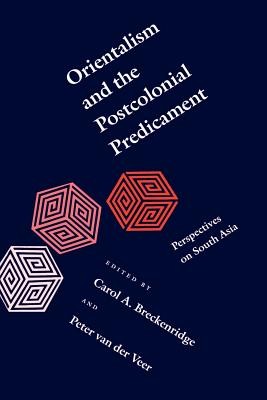
- We will send in 10–14 business days.
- Publisher: University of Pennsylvania Press
- Year: 1993
- ISBN-10: 0812214366
- ISBN-13: 9780812214369
- Format: 15.4 x 22.9 x 2.3 cm, softcover
- Language: English
- SAVE -10% with code: EXTRA
Orientalism and the Postcolonial Predicament (e-book) (used book) | bookbook.eu
Reviews
Description
In his extraordinarily influential book Orientalism, Edward Said argued that Western knowledge about the Orient in the Post-Enlightenment period has been a systematic discourse by which Europe was able to manage--even produce--the Orient politically, sociologically, militarily, ideologically, scientifically, and imaginatively. According to Said, European and American views of the Orient created a reality in which the Oriental was forced to live. Although Said's work deals primarily with discourse about the Arab world, much of his argument has been applied to other regions of the Orient.
Drawing on Said's book, Carol A. Breckenridge, Peter van der Veer, and the contributors to this book explore the ways colonial administrators constructed knowledge about the society and culture of India and the processes through which that knowledge has shaped past and present Indian reality. One common theme that links the essays in Orientalism and the Postcolonial Predicament is the proposition that Orientalist discourse is not just restricted to the colonial past but continues even today. The contributors argue that it is still extremely difficult for both Indians and outsiders to think about India in anything but strictly Orientalist terms. They propose that students of society and history rethink their methodologies and the relation between theories, methods, and the historical conditions that produced them. Orientalism and the Postcolonial Predicament provides new and important insights into the cultural embeddedness of power in the colonial and postcolonial world.EXTRA 10 % discount with code: EXTRA
The promotion ends in 20d.01:50:42
The discount code is valid when purchasing from 10 €. Discounts do not stack.
- Publisher: University of Pennsylvania Press
- Year: 1993
- ISBN-10: 0812214366
- ISBN-13: 9780812214369
- Format: 15.4 x 22.9 x 2.3 cm, softcover
- Language: English English
In his extraordinarily influential book Orientalism, Edward Said argued that Western knowledge about the Orient in the Post-Enlightenment period has been a systematic discourse by which Europe was able to manage--even produce--the Orient politically, sociologically, militarily, ideologically, scientifically, and imaginatively. According to Said, European and American views of the Orient created a reality in which the Oriental was forced to live. Although Said's work deals primarily with discourse about the Arab world, much of his argument has been applied to other regions of the Orient.
Drawing on Said's book, Carol A. Breckenridge, Peter van der Veer, and the contributors to this book explore the ways colonial administrators constructed knowledge about the society and culture of India and the processes through which that knowledge has shaped past and present Indian reality. One common theme that links the essays in Orientalism and the Postcolonial Predicament is the proposition that Orientalist discourse is not just restricted to the colonial past but continues even today. The contributors argue that it is still extremely difficult for both Indians and outsiders to think about India in anything but strictly Orientalist terms. They propose that students of society and history rethink their methodologies and the relation between theories, methods, and the historical conditions that produced them. Orientalism and the Postcolonial Predicament provides new and important insights into the cultural embeddedness of power in the colonial and postcolonial world.

Reviews